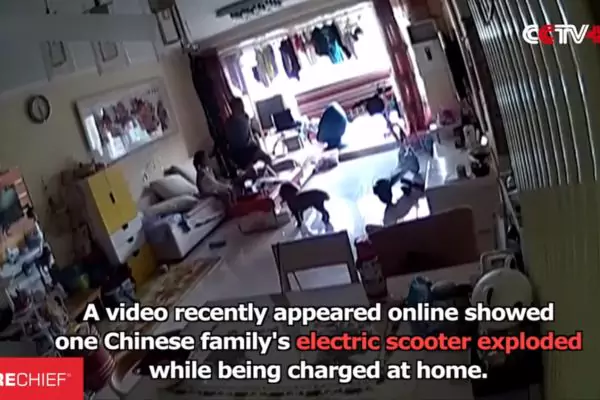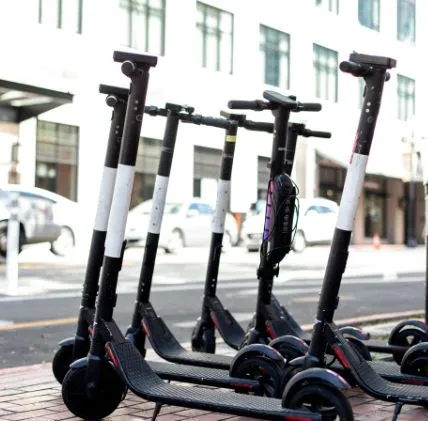Electric scooters are catching fire due to the type of batteries used in them. Lithium-ion batteries are typically used in electric scooters, and when these batteries become damaged or overcharged they can lead to a chain reaction of thermal runaway events which cause the battery to catch on fire. This risk is exacerbated by cheap components that may be used for cost savings, such as low-quality wiring and insulation, resulting in an increased risk of shorts and overheating.
Furthermore, improper maintenance or misuse of electric scooters can also contribute to potential fires since it increases the chance of mechanical failure leading to electrical arcs coming into contact with combustible materials like plastic parts.
Electric scooters are a revolutionary form of transportation that has become increasingly popular in recent years. They offer an eco-friendly and convenient way to get around, but with their growing popularity comes some serious safety concerns. A growing number of electric scooter fires have been reported across the country, raising questions about why these devices are catching fire and how to prevent it from happening again.
One of the most common reasons for electric scooter fires is due to defective batteries or chargers. Lithium-ion batteries the type used in many electric scooters are prone to overheating if they malfunction or are damaged, leading to potentially dangerous conditions that can result in a fire. Poorly designed battery housings can also cause hot spots where heat builds up and eventually leads to a fire as well.
Improper charging practices such as leaving the device plugged in overnight or using too much current when recharging can also lead to battery issues resulting in a fire hazard. In addition, poorly maintained or faulty wiring on an electric scooter could lead to sparks that ignite combustible materials nearby, causing a potential blaze.
Contents
- 1 Electric Scooter Fire Hazard
- 2 Scooter Catches Fire
- 3 Do Electric Scooters Explode?
- 4 Electric Scooter Recall
- 5 Gotrax Scooter Fire
- 6 How Often Do Electric Scooters Catch on Fire?
- 7 What is the Problem With E-Scooters?
- 8 Can Electric Scooters Overheat?
- 9 FAQs
- 10 Why Are Some Electronic Bikes and Scooters Catching Fire?
- 11 Final Thoughts
Electric Scooter Fire Hazard

Electric scooters, also known as e-scooters, are becoming increasingly popular due to their convenience and ease of use. However, with any battery-powered device comes the potential for fire hazards. Electric scooter fires can be caused by a number of factors including faulty wiring or batteries, improper charging, and overloading.
It is important to understand the risks associated with electric scooter use in order to stay safe while using them. First off, it’s essential to make sure that your electric scooter is properly maintained and serviced regularly. This includes checking all connections and wires for wear or damage on a regular basis as well as making sure the battery is fully charged before each ride.
Additionally, never attempt to modify your e-scooter yourself; always take it to an authorized service center for repairs or adjustments if necessary. Another important safety measure when operating an electric scooter is proper charging habits.
Scooter Catches Fire

Scooter fires are a growing safety concern that should not be taken lightly. Over the past few years, there have been numerous reports of electric scooters catching fire or exploding due to issues with their lithium-ion batteries. As more people turn to electric scooters as an environmentally friendly and convenient form of transportation, it is important for riders to understand the risks associated with these devices and how to keep themselves safe.
The most common cause of scooter fires is overheating or overcharging of the battery packs. When a battery pack gets too hot, it can short circuit and ignite flammable materials in its vicinity – including combustible liquids like gasoline or oil that may be present on the road surface. Additionally, if a battery pack is charged beyond its stated capacity for prolonged periods, this can also lead to overheating and ultimately fire hazards.
When using an electric scooter, there are several precautions you can take to reduce your risk:
- Make sure your battery is fully charged before use but don’t leave it charging overnight; unplugging when done prevents excessive heat buildup during charging which could cause a fire
Do Electric Scooters Explode?
Electric scooters, which are a popular form of transportation for many people around the world, have been in the news recently due to their potential to explode. This has left some people wondering if electric scooters can really explode and what causes them to do so. The truth is that while it is technically possible for an electric scooter to explode, it is actually very unlikely.
The vast majority of electric scooter explosions occur when there’s a problem with either the battery or charger used by the user. Improperly charged batteries are particularly prone to exploding due to overheating or overcharging, which could lead to a fire or explosion depending on how severe the issue is. In addition, some users may not be aware that certain components within an electric scooter, such as lithium-ion batteries must be properly maintained and replaced regularly in order for them to function safely and effectively.
If these parts are not taken care of properly then they can become damaged over time, leading them towards becoming more prone to explosion when exposed to high temperatures or pressure levels from charging too quickly or at high voltage levels.
Electric Scooter Recall
The electric scooter industry has had its share of recalls lately. From batteries exploding to brakes malfunctioning, safety is a top priority for companies in the e-scooter market. Recently, several major manufacturers have issued voluntary recalls due to potential safety issues with their products.
In May 2020, Segway recalled more than 25,000 Ninebot KickScooters after receiving reports that some of the batteries were overheating and causing fires. The recall affects all models of the Ninebot series manufactured between April 2018 and March 2019. Customers who purchased one of these scooters are advised to contact Segway directly for instructions on how to receive a new battery or a refund/replacement of their current unit.
In July 2020, Razor USA LLC issued an additional recall affecting about 527,000 Power Core E90 Electric Scooters sold between December 2017 and June 2020 due to brake failure risks associated with excessive speed when riding down hills or slopes. Affected customers can contact Razor USA directly for instructions on how they may receive either a free repair kit or a full replacement product at no cost depending on whether their unit meets certain criteria established by Razor USA LLC as part of this recall program.
Gotrax Scooter Fire
As the popularity of electric scooters continues to grow, so do safety concerns. One particular incident in 2019 has left many people wondering how safe these devices are: a Gotrax scooter caught fire. On August 20th, 2019, an individual reported that their Gotrax GXL scooter had violently burst into flames while charging overnight.
The owner was lucky enough to escape unharmed but the charger and battery were completely destroyed in the process. This incident raised eyebrows with many questioning whether or not this could happen on other electric scooters as well. In response to this event, Gotrax launched an investigation and released a statement saying that they took the matter seriously and would work diligently to find out what happened and ensure it does not occur again in any of its products.
They also offered free replacements for any affected customers who had purchased one of their electric scooters within 30 days prior to the incident occurring – even if their current device wasn’t damaged by fire itself!
How Often Do Electric Scooters Catch on Fire?
Electric scooters, or e-scooters, have become increasingly popular in recent years due to their convenience and affordability. However, there are some potential safety issues associated with them that must be taken into consideration. One of these issues is the risk of fire.
So, how often do electric scooters catch on fire? The answer to this question depends heavily on the make and model of the electric scooter in question as well as its usage habits. Generally speaking, however, reports suggest that incidents involving fires caused by e-scooters are relatively rare when compared to other types of vehicle fires.
When looking at reports from various sources it appears that most cases involving electric scooter fires occur due to user negligence or faulty parts rather than any issue inherent in the design itself. For example, a common cause for an e-scooter catching fire is overcharging the batteries which can lead to them becoming too hot and eventually combusting. Additionally, if users don’t properly maintain their scooter (e.g., changing worn-out brake pads), then they may put themselves at risk for a fire occurring suddenly while riding it due to friction-generated heat buildup within certain components like brakes or motors, etc.
What is the Problem With E-Scooters?
Over the past few years, electric scooters (e-scooters) have become increasingly popular in cities around the world. While these fun and convenient transportation options may seem like a great way to get around, there are several potential problems that come with them. One of the biggest issues is safety.
E-scooter riders often lack proper safety training or experience, so they can easily injure themselves by riding recklessly or not following traffic laws. Additionally, e-scooters don’t offer any protection from other vehicles on the road; collisions between an electric scooter and a car can be extremely dangerous for both riders and drivers alike. The risk of serious injury is even higher at night since visibility is reduced due to inadequate lighting on most models of e-scooters.
Another problem associated with e-scooters is their environmental impact. Some electric scooter companies claim their products are zero emissions but fail to mention that manufacturing and disposing of batteries produces significant carbon emissions which contribute significantly to climate change.
Can Electric Scooters Overheat?
Electric scooters are growing in popularity as an economical and eco-friendly way to get around town. With their convenience and low cost, it’s no wonder they’re becoming so popular. But one question that often comes up is whether electric scooters can overheat.
The simple answer is yes, electric scooters can overheat if not properly cared for or used correctly. The most common cause of overheating on an electric scooter is using too much power while riding the vehicle at a high speed or taking sharp turns which causes the motor to work harder than necessary. If this happens too often, the motor will begin to heat up beyond its normal temperature, leading to potential damage and possible breakdown of the engine components.
Another cause of overheating on an electric scooter is inadequate battery management, either by leaving them plugged in for long periods of time or regularly draining them below 20 percent charge level before recharging. Doing so puts strain on the batteries and can lead them to become hot quickly when being charged back up again after use. Additionally, failing to clean your battery contacts from dirt and debris buildup can also reduce efficiency resulting in increased temperatures during use and charging cycles.
FAQs
What should I do if my electric scooter catches fire?
In case your electric scooter catches fire, prioritize your safety and the safety of those around you. Move away from the scooter and any flammable objects, if possible. Call emergency services immediately and follow their instructions. Do not attempt to extinguish the fire yourself unless you have the proper training and equipment.
How can I prevent my electric scooter from catching fire?
To prevent your electric scooter from catching fire, follow these guidelines: use the manufacturer-recommended charger, avoid overcharging the battery, store the scooter in a cool and dry place, inspect the battery regularly for damage or swelling, and immediately report any unusual behavior or signs of overheating to the manufacturer.
Are there any regulations or standards in place for electric scooter safety?
Yes, there are regulations and standards in place to ensure electric scooter safety. Different countries and regions may have specific requirements for electric scooter manufacturers to meet regarding battery safety, electrical systems, and overall design.
Why Are Some Electronic Bikes and Scooters Catching Fire?
Final Thoughts
Electric scooters are quickly becoming the trendiest new way to get around town. With their lightweight design and electric motor, they offer a convenient and eco-friendly alternative to cars or public transportation. But with more riders taking to the streets in them, there has been an increase in reports of electric scooters catching fire.
This is concerning for all involved — riders, property owners, and manufacturers alike — as fires can be dangerous and cause extensive damage. So why are these vehicles so prone to catching fire? The primary reason for electric scooter fires is that most models contain powerful lithium-ion batteries which store large amounts of energy in a small package.
While this makes them perfect for providing power on the go without having to stop and recharge often, it also means that if something goes wrong with the battery itself or its wiring system then sparks can ignite flammable materials nearby resulting in a blaze that’s difficult to control. Additionally, poor quality components from some manufacturers may not meet safety standards leading to faulty items which increase risk even further when used regularly by consumers.


